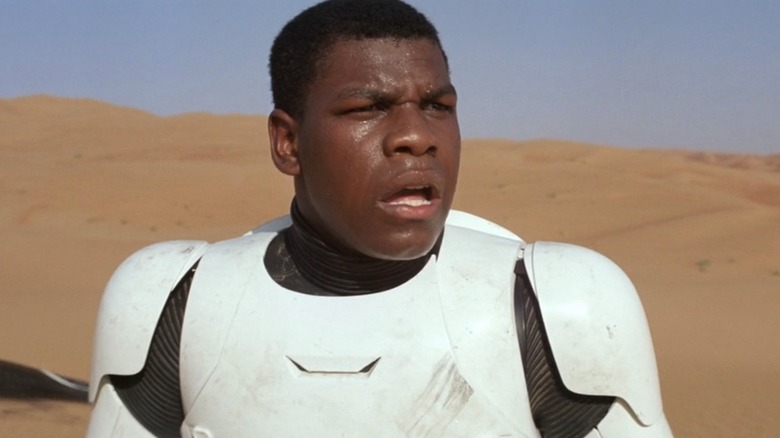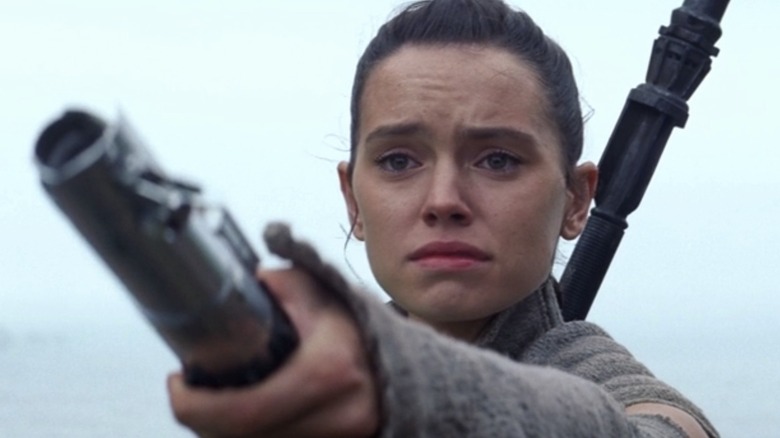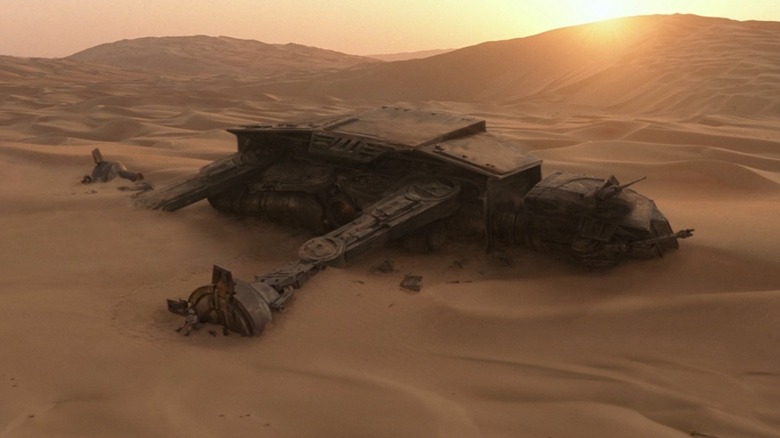J.J. Abrams Fully Intended On Declining Star Wars: The Force Awakens
In the behind-the-scenes documentary, "The Secrets of The Force Awakens: A Cinematic Journey," Lucasfilm president Kathleen Kennedy can be seen announcing J.J. Abrams as the director of the next "Star Wars" movie at a board meeting on January 4, 2013. Even before his sequel, "Star Trek Into Darkness," hit the multiplex in May 2013, Abrams had one foot on another starship. You can see in that movie's ship chase on the Klingon homeworld how Abrams was maybe living out some of his Millennium Falcon dreams through "Star Trek," anyway.
Released in December 2015, "The Force Awakens" would be the first "Star Wars" film since creator George Lucas wrapped up his prequel trilogy in 2005 and subsequently sold his company to Disney for $4 billion. This movie alone made half that much money at the box office, enjoying a franchise-best haul that helped restore the cultural relevance and dominance of "Star Wars" in those pre-Disney+ days of yore.
Abrams, however, essentially had two "Star Trek" movies under his belt already, plus "Mission: Impossible III," his feature-length directorial debut. Between "Star Trek" and "Star Trek Into Darkness," he had made a more personal sci-fi film, "Super 8," and he wasn't necessarily eager to jump into another franchise when Kennedy first approached him about helming "The Force Awakens." In "The Secrets of The Force Awakens," Abrams tells the camera:
"When Kathy Kennedy called and asked if I'd be interested in directing this film, I fully intended to say no, because I've been involved in other movies that were sequels, and I just thought I didn't want to do that again. But it was 'Star Wars,' and I knew Kathy."
'A great starting point for a story'
Part of what swayed J.J. Abrams and got him to more seriously consider Kathleen Kennedy's suggestion that he direct "The Force Awakens" was an early embryonic image of the character Rey (Daisy Ridley) would become. In "The Secrets of The Force Awakens," Abrams explains:
"When we were discussing it, there was this one moment that I instantly had the chills considering, which was: a young woman, what her story is, I had no idea. But saying, 'Where's Luke Skywalker?' It was so titillating, the notion that this character who we all know would be discovered by some new young heroine. [It] was incredibly intriguing. It just felt to me like that was a great starting point for a story."
Before the release of "The Force Awakens," Kennedy told a slightly different version of this story, where Abrams was "in" almost immediately and the question that gave him chills was, "Who is Luke Skywalker?" That would seem to tease a story where Luke, once the galaxy's greatest hero, might be redefined for a new generation, or forgotten by it entirely.
This was back when "Jurassic World" director Colin Trevorrow was still linked to the then-untitled "Star Wars: Episode IX." At the time, Abrams denied that he would direct "Episode IX," though he later changed his mind, as with "Episode VII: The Force Awakens."
Abrams delivered an intentionally safe, by-the-numbers bridge between old and new that, true to his thoughts, has a great starting point. And fittingly, it was a great starting point for Disney's "Star Wars" sequel trilogy as well, though Abrams himself couldn't stick the landing when he returned to helm "The Rise of Skywalker," a movie that got away from him and he arguably should have declined.
A scavenger sequel
"The Force Awakens" begins with Poe Dameron (Oscar Isaac) hiding the map to Luke Skywalker's whereabouts in a droid during a Stormtrooper attack. Poe, BB-8, and the map take the place of Princess Leia, R2-D2, and the stolen Death Star plans in "Star Wars: A New Hope." This is but the first of many plot beats that echo moments from the original "Star Wars" trilogy.
When it's just Rey on Jakku — sledding down from a crashed Star Destroyer and trading scavenged parts for portions — "The Force Awakens" makes good on her as the foundational inspiration for a new era that feels more like "Star Wars" than anything in the prequels. The movie does offer some new ideas, like that of a Stormtrooper, Finn (John Boyega), bucking his conditioning to become one of the good guys.
Then, well, the Rathers roll in. By the end, J.J., the Jakku junker, has himself scavenged too many familiar old "Star Wars" elements, with characters even acknowledging Starkiller Base as yet "another Death Star." This remix approach and its commercial success helped set off a wave of further scavenger sequels to beloved franchise films in Hollywood (which continues to this day).
When it first came out, "The Force Awakens" was often praised as the best "Star Wars" movie since "The Empire Strikes Back," a sentiment that would be repeated two years later for "The Last Jedi." Soon after, the dark times began anew, as "Star Wars" fandom grew more divided and some turned to the Troll Side of the Force, labeling Rey a Mary Sue despite the long history of Gary Sues in cinema. Yet if it weren't for the success of "The Force Awakens," we might never have gotten the likes of "Andor," and for that, we are all indebted to J.J. Abrams.


